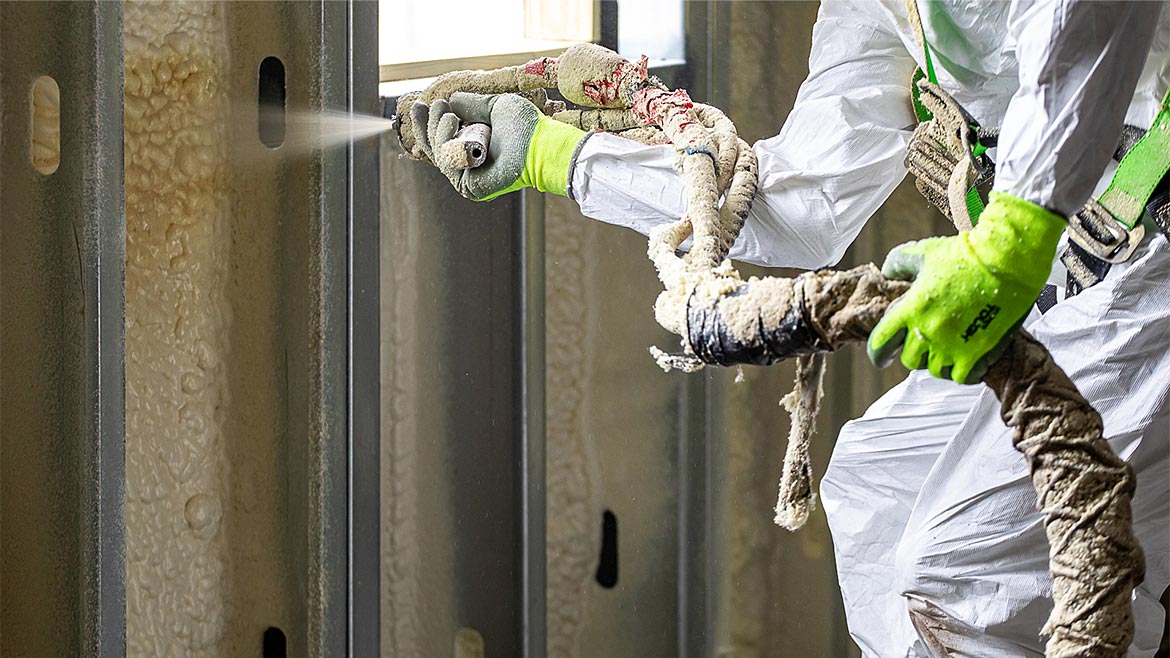Commercial spray foam insulation is an efficient and effective way to insulate commercial buildings. It provides a seamless air barrier and thermal seal, reducing energy costs and improving indoor comfort.
With its superior insulation properties, spray foam insulation is a popular choice for commercial spaces where energy efficiency is a priority. It can be applied to various surfaces, including roofs, walls, and floors, providing a versatile solution for businesses looking to enhance their building’s energy performance.
Additionally, spray foam insulation also acts as a moisture barrier, preventing mold and mildew growth, making it a durable and long-term investment for commercial properties. When considering insulation options for commercial buildings, spray foam insulation is a top choice for its performance, cost-effectiveness, and long-term benefits.
Benefits Of Commercial Spray Foam Insulation
Commercial spray foam insulation offers numerous benefits for businesses and commercial properties. One major advantage is its superior insulation properties, which can help reduce energy consumption and lower utility costs. Spray foam insulation creates a seamless barrier that seals gaps and leaks, preventing air infiltration and heat transfer.
This can result in a more comfortable indoor environment and better temperature regulation throughout the year. Another benefit is its ability to improve indoor air quality by reducing the entry of pollutants, allergens, and moisture. This can help create a healthier and more enjoyable work environment for employees and customers.
Additionally, spray foam insulation can enhance the structural integrity of a building by providing added support and stability. It is a durable and long-lasting insulation option that can withstand harsh weather conditions and resist pests and mold. Overall, commercial spray foam insulation is a cost-effective and efficient solution for businesses looking to improve energy efficiency and sustainability.
Application Techniques For Commercial Spray Foam Insulation
When it comes to applying commercial spray foam insulation, several techniques can help ensure a successful outcome. One important guideline is to carefully follow application techniques to maximize the effectiveness of the insulation. In this article, we will discuss three key guidelines to consider.
Firstly, it is important to avoid starting sentences with commonly overused words or phrases. This helps to maintain reader interest and prevent repetition throughout the article. Secondly, using a variety of phrases at the beginning of paragraphs can further engage the reader and keep the content fresh.
By choosing different expressions, the information presented remains intriguing and captivating. Finally, it is not necessary to include a conclusion paragraph as a strict requirement. Instead, the article can be wrapped up by summarizing the main points in the final paragraph.
By adhering to these guidelines, you can effectively apply commercial spray foam insulation, ensuring optimal results for your project.
Cost Considerations And Roi Analysis For Commercial Spray Foam Insulation
Commercial spray foam insulation offers numerous benefits for businesses, including energy efficiency, improved air quality, and cost savings. However, before investing in this insulation method, it is essential to consider the associated costs and analyze the return on investment (ROI).
The upfront cost of commercial spray foam insulation may be higher compared to traditional insulation methods. However, its long-term savings can outweigh the initial investment. The precise cost of the installation depends on various factors such as the size of the building, the complexity of the project, and the specific type of spray foam used.
It is crucial to conduct a detailed cost analysis and ROI assessment to determine if commercial spray foam insulation is a financially viable option for your business. By comparing the energy savings and reduced maintenance costs over the insulation’s lifespan, you can make an informed decision regarding its feasibility and potential cost benefits.
Environmental Impact And Sustainability Of Commercial Spray Foam Insulation
Commercial spray foam insulation has gained attention due to its environmental impact and sustainability. As companies strive to reduce their carbon footprint, this insulation option has become an attractive choice. Its energy efficiency and air-sealing properties contribute to a greener environment by reducing energy consumption and greenhouse gas emissions.
Additionally, the durability of spray foam insulation offers long-term benefits, minimizing the need for frequent replacements and reducing waste. Its ability to create an airtight seal also leads to improved indoor air quality, promoting healthier and more sustainable living and working environments.
As businesses continue to prioritize sustainability, the use of commercial spray foam insulation presents itself as a promising solution for reducing environmental impact and enhancing sustainability.
Common Challenges And Solutions In Commercial Spray Foam Insulation Applications
Commercial spray foam insulation can present a range of challenges in various applications, particularly in commercial settings. One common challenge is ensuring consistent coverage and thickness throughout the insulation surface. This requires careful attention to detail and expertise in the application process.
Additionally, proper ventilation and curing time for the foam are critical factors that can impact the effectiveness of the insulation. Another challenge involves managing the potential for overspray and waste, which can affect both the quality of the insulation and project costs.
However, these challenges can be effectively addressed with thorough training for applicators, the use of advanced equipment and techniques, and strategic planning to minimize waste. By addressing these common challenges, commercial spray foam insulation applications can achieve optimal results in terms of energy efficiency, durability, and cost-effectiveness.
Conclusion
To sum it up, commercial spray foam insulation offers a range of benefits for businesses and industrial spaces. Its exceptional thermal insulation and air-sealing properties help reduce energy consumption and lower utility bills. With its quick installation process and long-lasting durability, spray foam insulation proves to be a cost-effective solution in the long run.
Additionally, it also contributes to a healthier indoor environment by reducing moisture and preventing the growth of mold and mildew. Invest in commercial spray foam insulation today for optimal energy efficiency and comfort in your commercial building.
